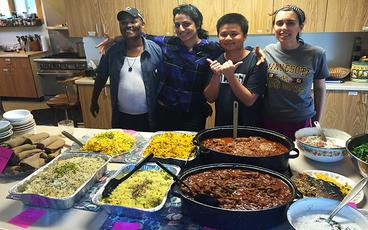and precious life?" - Mary Oliver, The Summer Day
Overview:
PHIL 4326/5326: Lives Worth Living: Questions of Self, Vocation, and Community has three goals:
- Students will explore large philosophical questions that open up possibilities and hopes for lives worth living. How is identity constructed? What is vocation? What experiences of community are desirable in a life?
- Students will use their philosophical explorations to reflect on their lives, their life experiences, and their futures.
- Students will reflect critically on how their first-hand experiences in Philosophy Camp, including their field experiences in innovative settings in the wider Windom community, fit with the picture of social change found in the tradition of popular and democratic education.
Field Experiences:
As an integral part of the Philosophy Camp experience, students will visit field sites near Windom. The field experience is an effort to develop positive relationships between the living-learning community of students and instructors and individuals and organizations in the Windom area. Field experience sites may include (subject to change):
- Cottonwood County Historical Society, Windom
- Jeffers Petroglyphs
- Western Community Action, Jackson
- St. John's Lutheran Home, Springfield
- End-O-Line Railroad Museum, Curry
- Southwest Crisis Center, Worthington
- Dean and Elizabeth Johnson Dairy Farm, Windom
- Batalden Farms, Lamberton
Inspiration:
Philosophy Camp is centered on the Socratic tradition of cooperative inquiry into large questions about how we can live our lives well. The ancient Greek philosopher Socrates did not take the stance of an authority who knows and tells, but rather the stance of an inquirer who is curious and open to the ideas of others. Philosophy Camp instructors hold a space where students and instructors together exchange stories and ideas that open up fresh ways of seeing the world and fresh possibilities for taking actions that build meaningful lives.
Philosophy Camp has been inspired in its methods by the educational philosophies and traditions of Denmark's folk high schools and the Highlander Folk School in Tennessee, both important and highly successful examples of what is now called democratic, or popular, or people's education. Those who take leadership in this kind of education take care to respect, draw out, and build on the experiences of life that students bring to their learning. Philosophy Camp aims to create for students an experience in the spirit of Highlander and of a 19th century Danish folk high school.
Socrates said that the unexamined life is not worth living. During Philosophy Camp all participants, students and instructors, will examine and imagine what sorts of lives are worth living in our socety. Learning circles and other large and small group activities will be used to help us examine our lives and our relationship to our communities, to bring to light hidden and limiting assumptions, and to expand our hopes for what is possible in our own lives and in the world.
